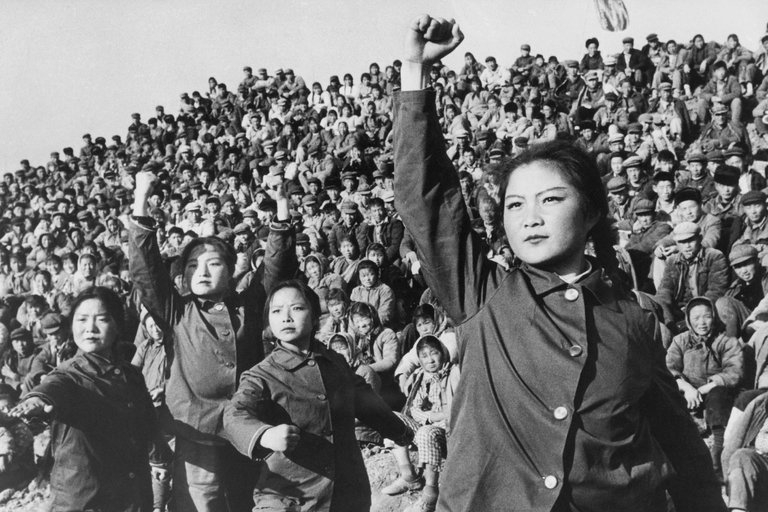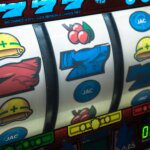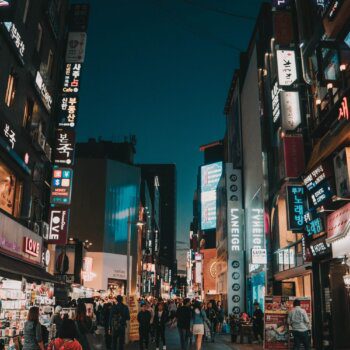To figure out the effects of national events on a society and to understand how a society’s behaviour patterns are shaped throughout the history, one should understand that society’s or nation’s psychology. In order to understand a nation’s psychology, one should look at the social psychology discipline. Barons, Byrne & Suls (1989) characterize social psychology as “…the scientific field that seeks to understand the nature and causes of individual behaviour in social situations”. Moreover, G. W. Allport defines social psychology as “the thought, feeling and behaviour of individuals are shaped by the actual, imagined or implied presence of others.”
In our contemporary era it can be said that no other country in the world faces dramatic conversions in terms of life styles, customs and values as Chinese society do. With a country of one billion people inhabitants and the second most powerful economy of the world which contributes to the evolution of the world, it is therefore crucial to understand the determinant cultural norms and historical events behind the contemporary behaviour patterns of Chinese society.
This post will investigate ubiquitous social characteristics of the contemporary Chinese society and the origin event or belief of those characteristics. Firstly, in the section two, the social and psychological characteristics of contemporary Chinese people will be given. Secondly, the effect of various Confucianism on Chinese people will be elucidated in the third section. Thirdly, how historical events have an influence on au courant Chinese way of thinking will be analyzed in the fourth section. Lastly, the effect of the government policies on the contemporary Chinese society and how those policies are paradoxical with human rights phenomena will be examined in the fifth section.
The Social and Psychological Characteristics of Chinese Society
On the characteristics of Chinese people, Sun states that, “When Chinese people are compared with those from other cultures, they have been found to be lacking in autonomy, aggression, and extroversion, and to exhibit excessive submissiveness, conformity, subservience to authority, and susceptibility to the influences of those more powerful than themselves.” This behaviour pattern difference emerges from the collectivist and individualist nature of different countries. Whilst individualist cultures applaud individual inclinations and dynamics within a society, collective concern is praised in collectivist cultures which devalue personal desire. What’s more, in Chinese culture communication between the individual and the collective is strongly bonded with social norms which are a product of value systems that are believed by most of the population. This directs us to analyse the terminology of ‘self’.
The Self in Chinese Culture
If the concept of ‘self’ is studied within the cultural framework, it can be observed that there are debates going on Ptolemian and Galilean paradigms on the concept of self. The importance of these paradigms is the first one represents the Western concept of personality and the latter represents the Asian concept of personality. According to the Western perception of personality, Ptolemian paradigm in other words, is grounded in individualism and an individual poses alone solo against the world. Moreover, the individual’s personality is consisted of his nervousness and that nervousness is determined by the quality and the essence of his/her social relations. Therefore, a person who tries very hard to satisfy his/her friends possibly will be seen as a person that has a heavy feeling of inferiority. On the contrary, according to the Asian perception of personality individual exists inside of a matrix of affiliation which the individual in that matrix tries to retain a dynamic equilibrium. This point of view represents the Galilean elucidation of human nature and it defends that the individual is rooted in a social network. In other words, Asian culture consists of preserving the harmony of relationships within the social network in which the individual’s anxieties are courted according to what roles they play in that network. Therefore, differently from the American culture, a person-pleaser is splendid in the Asian culture.
Based on this point of view, Catherine Lien and Lun Sun defines the Chinese psychosocial homeostatis as “…strongly rooted in a kinship system, and that this reliance on immediate kinsmen for intimacy makes it unnecessary for them to look beyond this boundary to seek the meaning of life. Consequently, the Chinese have not customarily developed secondary groups outside their kinship system, nor have they been known as world travellers, explorers, or conquerors.” However, by the state capitalism, this situation is gradually evolving. Today, we can see many Chinese as wanderlusts that travel the world. To portray Chinese character, Catherine Lien and Lun Sun divide Chinese Character into four models as social orientation model, person in relations model, the operating self and the private self and completion of self through interpersonal relating.
Social Orientation Model
According to Catherine Lien and Lun Sun, in Chinese social orientation model, there exist four modalities such as familistic, relationship, authoritarian and other orientation. Familistic orientation puts family on its core and brushes aside or diminishes the individual in other words. It gives high priority to male children than female children because of the sustainability of family line which is one of the biggest origins of the blatant gender inequality in China. Further, in order to achieve family harmony, it is awaited to give up personal goals and both individuals and family members should have the shared goals of bringing welfare and honour to family. And in a case such as one family member executed crime, the other members are expected to stick together to the outside world and protect the criminal family member. Lastly, people carry their family values and ethics to the society which is called pan-familization. In Chinese companies it is common to call someone sister, brother, uncle or aunt.
Second modality is relationship orientation which gives importance to self who is in connection to others instead of a detached individual. The third modality is the authoritarian orientation which represents the patriarchal and hierarchical culture of China. Characteristics of this orientation are; authority worship such as unquestionable acceptance of the authority of a person who signed as authority. The last modality is other orientation which reflects the Chinese people’s anxiety with face concept that is the fear of exclusion and contemptuous laughter by other people and the urgency to be accepted by a group. These modalities can be traced down even today in the characteristics of contemporary Chinese society.
Person in Relations Model
In this model of Chinese Character, inter-personal communication specifies the individual’s self-identity. On this issue, Lien and Sun claims that,
For instance, it is not unusual to refer to a person’s various relationships when making social introductions: “He is so-and-so’s son,” “He is married to so-and-so,” or “He works for so-and-so,” instead of referring to the person’s personal attributes. It would seem that in a Chinese society, who you are related to defines you more than the personality attributes that you possess.
The Operating Self and the Private Self
Chinese concept of self consists of a da wo (large self) and xiao wo(small self). The large self is the operating self who indicates the group that the individual is in whereas, the small self refers to the private self which is hidden from the public. This terminology is important because there are three conditions which a Chinese individual has to adjust himself according to those conditions. Lien and Sun exemplified these conditions as;
The first aspect concerns the process of conflict resolution between the large self and the small self. The collectivity one identifies with may make demands that are at odds with the wishes and desires of the self. For instance, a person’s family may demand that he/she becomes a doctor while he/she wants to be a painter. The process of conflict resolution involves the gradual relinquishing of the small self to make room for the large self, and ultimately the person is expected to set aside his/her aspirations of becoming a painter and study medicine instead. The second aspect focuses on the process of social comparison, from which an individual comes to realize how well he/she is doing in his/her pursuit of the Confucian ideal of jun zi (a moralist/gentleman), or how adequately he/she is resolving the conflict between his/her large self and small self. The more a person becomes a jun zi, the more he/she is inclined to relinquish his/her small self for the sake of satisfying the large self. The third aspect concerns the self-esteem acquired as one comes to realize that, by relinquishing one’s small self to embrace the large self, one is indeed on one’s way to becoming a true jun zi and attaining sagehood. The notion of sacrificing the private self to complete the operating self (xi sheng xiao wo, cheng quan da wo) is well known and widely endorsed. The concept of the large self and the small self-further illustrates the supremacy of collectivity over the individual in Confucian culture. This is The Self in Chinese Culture achieved not through negative sanctioning, but rather by inspiring each follower to becoming a jun zi, the highest Confucian ideal.
Apparently, Chinese people ever so often are obliged to do something or become someone. Behaving according to an individual’s own will is not possible within the society. Therefore, individuals in Chinese society are repressed by those social norms.
Chinese View of Life
a. Beliefs and Philosophies
Confucianism
Confucianism is one of the most crucial doctrines that defined the modern Chinese and the other Asian cultures. Confucian ethics are significant as cultural theories for scholars in terms of people’s mentality studies in Chinese society.
When Confucianism first appeared, there was a huge chaos within the feudal states. Therefore, the best question to ask was “What is the best way to order society and government?” Consequently, Confucianism was shaped around this purpose. Basically, he assumed that if everyone knows their order in society, that society will be in harmony. He developed a relationship system which is interconnected as a network model. In this system lower level have to obey to the higher level which means the equality only stays within the borders of the social ranks. Consequently, age and authority became paramount for Chinese culture and society. In contemporary China, the hierarchy or status difference can still be observed between ruler and minister, father and son, elder brother and younger brother, husband and wife, friend and friend.
Furthermore, in comparison with Western cultures, people are characterized by what they have achieved rather than affiliated to a group and they have been supported for individual expression whereas in Confucianism, collectivism is essential for a Confucian society. In Chinese society, people do not stand independently from the group and the individual is defined by his or her affiliation to the matrix of relationships. Moreover, one always has to relate his or her own desires to a greater aim for the group. However, modern Chinese society is gradually evolving because of the state capitalism and the other policies of the government. The society now is becoming more “Westernized” and individualistic. The best example for the evolution of the society’s mind set may be the words of Deng Xiaoping as “To be rich is glorious”
b. Values
Guanxi
Guanxi means connections in English. For Chinese, world consists of the network family, personal and professional relationships. In other words, for Chinese people get business or other bureaucratic things done can be only possible through Guanxi because China has a very intense bureaucracy system and passing that is extremely intricate. Therefore, for Chinese Guanxi is the only way to handle the red tape.
One example to Guanxi is a scandal of 23-year old Li Qiming, the son of a famous and forceful deputy police chief named Li Gang. Li Qiming attends to a party, takes alcohol and then he drives drunken around the Hebei University area. Eventually, he crashes two female students and one dies from injuries. After the caught, he shouts as “Sue me if you dare, my father is Li Gang!” Expectedly, his conviction decreases. The case proves that Guanxi is paramount for Chinese culture. However, it also indicates that cases such as corruption and crime are dramatically increasing because of Guanxi. It is ubiquitous that contemporary Chinese standard of judgement is at stake.
Face
Chinese concept of face is highly influenced by Confucianism. It is discovered by Westerners with the German missioner Wilhelm Wundt who lived in China for 25 years. He chased the cultural root of Chinese concept of face According to Wundt, the essence of Chinese society’s character comes from Confucianism and Taoism. Vigorous support on harmony in Confucianism made Chinese people to work hard in order to get what they deserved within the social rank in their community and this dedication may result in two types of Chinese character which are ai mianzi (face loving) mei fazi (having no way).
During 1940s, Hu implements an anthropological approach and analyzed the mianzi and lian concepts. On those conceptions she states that, mianzi is referred to the social prominence which is paramount for Chinese people. Mianzi is a prestige which is obtained by a person by hard working and accomplishments during his or her life. And to have such a reputation, one has to have social networks to acquire confirmation from other people within that social network. Whereas lian, is the social dignity presented by the social network to an individual who holds the high morality. In other words, it represents the public faith for the individual’s integrity. If an individual loses the lian, he or she would not be able to behave normally in that group. Lian is both a social restraint for sustaining ethicalness ideals and internal enforcement for self-suppression.
Confucianism was one of the paramount aspects that have shaped the Chinese character and constructed the essence of traditional Chinese society. Even today, its doctrine’s reflections can be traced in the contemporary China. Confucius has composed a society who is humanistic, follows the Way of Humanity, neat and sincere, lacks of violence, thinks by heart and strives for the perfect moral standards. However, by the Communism, the traditional Chinese society’s structure would evolve forever.
The transformation of Chinese society during the national events
- Communism
The Communist Revolution is one of the defying points of Chinese socio-cultural structure. It transformed every aspect of Chinese traditional life-style and invented a completely different society. Even today, the effects of Communism can be traced within the Chinese society.
Conventional views towards woman were entirely evolved because of the difference between the traditional view towards woman and communist view towards woman. Conventionally, men are supreme to women. A woman should obey to her father, husband and also to her son. However, by the Marriage Law, this point of view has been terminated. Moreover, with the Communism, baby girl abandonment and murder has been banned along with the prohibition of child marriage. To this end, many relinquishments have been acted. According to Communism, women and men are equal. Therefore, it can be defended that with Communism, women lifted to an equal status with men. However, this was only in paper. It never espoused by the society thus, it did not last long.
The portrayal of Communist women evolved to a man alike and worker one. However, in my opinion, even though women now became equal to men, their female identity has been reduced. On this issue, Mao Zedong had advocated that “women hold up half the sky”. In addition, by the Marriage Law, signed in 1950, the supreme authority of man over woman has been terminated by the given right to woman to divorce her husband. However, as said above, women lost their identity within the newly formed society of China. Because, The China Communist Party (CCP) had progressively tried to demolish the family and made men and women live in the single-sex barracks along with putting children into nurseries. During the Famine of 1959-1961, social rights that women achieved had been lost.
In terms of religion, things were harsher. According to Mao, religion was poison and dreadful as Nazism. Therefore, it should be immediately terminated. To this end, in his era, many churches were damaged, priests and monks were attacked and only churches which exhorts communism were permitted to exist. Meanwhile in Tibet, genocide was taking place. Buddhists were slaying because of the fear of a possible Buddhist nationalist movement. Furthermore, also in Xinjiang area, the CCP scared from an Islamic nationalist movement and eventually invaded the area by militant junta and brought Chinese people to assimilate the Xinjiang Muslims. In this period, Chinese society has witnessed severe human rights violations. Societies which gone through such transgressions become more oppressed and obedient societies which lack of seeking their rights.

- Cultural Revolution
Another devastating turning point for Chinese society is Cultural Revolution. Mao wanted to erase the traditional Chinese culture entirely thus, he deployed his wife as ‘the cultural purifier of the nation.’ Therefore, demolishment studies of bourgeois culture of China had begun along with the ban of conventional songs, dances, festivals. Instead, children were forced to sing communist propagandas and only proletarian literature and art were allowed. In addition, about 130 million people had to leave the school and work in the rural areas. One of the bitterest parts of the revolution was many artists and teachers who were spreading the art in the society were imprisoned, tortured and persecuted.
In the documentary called From Mao to Mozart: Isaac Stern in China, the famous violinist Isaac Stern goes to China in order to evaluate the children who study in art schools and try to interpret the Western pieces. After he listens them playing, he discovers that Chinese children were achieved almost perfection in their techniques however, they lack of passion and devotion which constitutes the most essential part of the music. He states that even though Chinese students play with great technique, they cannot feel the music in their souls and he relates this situation to the Cultural Revolution. Because of the revolution, Chinese people are oppressed so dreadfully that they became more mechanic and fail in terms of free and comfortable expression of their feelings.
In an experiment of Tomas Plänkers, he conducts interviews with the people who lived throughout the Cultural Revolution and calls them first generation and second generation to their children. The experiment is like a proof of what Chinese society has become today. He and his experiment group discovered that,
However, with four interviewees we found early separation traumata, especially existential survival anxieties due to extreme poverty. When these interviewees spoke about early relationships with parents or grandparents, they mostly reported a depressive dependency, especially on their mothers or grandmothers.
During the interviews, he figured out that the interviewees have witnessed distressing human rights violation.
When the interviewees spoke about the Cultural Revolution, they mostly portrayed themselves as victims: They outlined the violence they had suffered and its consequences…Altogether, we were impressed by the extent of violence this small number of interviewees reported suffering. They described observations of violence against previously respected authorities, for instance college lecturers were publically humiliated and beaten. They became witnesses to suicides, torture, and detention. They learned that members of their peer group (e.g. students) became violent. Understandably, their own experiences dominated the interviews. They described, how their privacy was penetrated (e.g. destruction of the household effects, 3A); their family cohesion destroyed; how they were hindered professionally, persecuted, accused and humiliated publicly, insulted, socially isolated, arrested, and tortured (with night-long interrogations, sleep deprivation and caning). They became victims of different types of physical violence.
Mr Wang (3A): Beaten with leather straps, salt poured into wounds, urinating into the children’s meal, destruction of his furnishings.
Mr Li (4A): All night interrogations, sleep deprivation, strokes.
Mr Zhao (6A): Interrogations with torture, banging his head against the wall, kicking his head, dirtying him with sewage, stubbing cigarettes on his skin, forcing him to undress, trying to drive him to suicide, crippling of his legs by strokes.
Moreover, he states about a second generation interviewee that,
This daughter, born during the Cultural Revolution (1971), identified herself with her strict, intrusive father (born 1940). At the time of the interview, she was a rather anxious, conflict avoiding person, with a resigned depressive mood and a distinct inhibition of aggression. She took over the strict super-ego her father had demonstrated from childhood. For example, like him, she beat her daughter and was achievement-orientated. We also discovered a disturbance of her female identity. In both generations, we understood the exaggerated achievement orientation as a defence against coming into contact with internal weakness, with anxieties and with the sequelae of traumatic experience.
Shortly, an oppressed and harassed generation who gone through the Cultural Revolution raised a second generation who have low self-esteem, lack of constructing healthy relationships and lack of making healthy judgement. As a result of inter-generational transfers, contemporary Chinese society is a reflection of the oppression, violation of rights and tortures experienced in the Revolution.
Social Psychological Issues in Contemporary Chinese Society
- The Government and the Human Rights Violations in Contemporary Chinese Society
The destruction of communist regimes uncovered the fact that democracy together with human rights should be getting rid of its narrowed form of governments and become a global aspiration. The human right abuses committed under dictatorships relentless to its side has proved that the model of political system within a nation is highly correlated with fundamental human rights that its people deserve.
Today still carrying Communism leftovers in her hunch, China sustains its regime as an authoritarian government that bridles essential rights such as freedom of speech and religion when it feels threatened by the application of these rights. Ch’u Chai and Winberg Chai states that according to Communist morality, a comrade can both love and hate people which is the opposite of Confucius doctrines. The government who adopted this motto rules the Chinese society along with controlling and deciding for every aspect about the society from media to religion, restricting freedom of speech and freedom of thought. Even though the Chinese government could manage to create a middle class, they have been controlling by the government as it was done from the establishment of Communism.
Starting with Mao during the Cultural Revolution, Chinese government has been committing severe humanitarian crimes. Furthermore, under Xi’s administration, extrajudicial imprisonment, persecution of minorities by religious reasons, restriction on freedom of speech and every other fundamental freedoms have been increased dramatically.
Latest critical issues are the prohibition of chair of the Bundestag’s Human Rights Committee to enter China after his criticism about violations in Tibet and Chinese officials are continuing to pressure the governments to be politic about ‘Tibet independence’. Furthermore, since last year more than 240 human rights lawyer have been arrested or questioned. In addition, one human rights activist Cao Shunli has died because of the insufficient health care and awful treatment. It is unacceptable that the Chinese government saw those lawyers and many more common people as a threat to its power along with detaining them and ruining their lives.
It is apparent that the evolution of China from a conservative state to a radical one has entirely changed the Chinese understanding of humanity which reflects the, traditional doctrines of Confucius that are about how to be a good person. Confucian doctrine of destiny commands people to fulfil themselves with humanity and gives them a duty to serve to their society with humanitarian aims.
Nevertheless, it seems like this transformation did not fully affected the Chinese society but rather the governments throughout the history. However, human rights were not invented by governments instead, they are protected by governments. Therefore, Chinese government should stop shaping universal rights and control the society for its wills and take measurements for its justice system.
Conclusion
I tried to investigate the transformation of the Chinese society under the influence of Confucianism and Communism and effects of those national events on the constitution of contemporary Chinese character. In addition, I wanted to reflect how the government’s policies are an implementation of the mottos acquired during the Revolution and how they are violating the rights written in the international human rights declaration today.
It is ubiquitous that both Confucianism and Communism are entirely evolved and shaped the Chinese society. As a result, contemporary Chinese society turned out to be a mixture of traditional Confucian doctrines and the communist along with the Cultural Revolution. Experiments have proved that today, because of the Communist and Cultural Revolution, many Chinese people suffered from the psychological problems such as low self-esteem, early attachment, anxiety, depression as intergenerational transfers from generation to generation. In conjunction to that, oppressive and controlling government policies violate Chinese people’s natural rights and highly enforce those psychological illnesses to sustain within the society by using the authoritarian side of Confucian values.
The oppressive government should immediately step back from controlling and violating every aspect of the society such as controlling the media, restraining freedom of speech and thought, restricting the rights of the migrated families, detaining lawyers, persecuting minorities because of the religious inducements and many more violations. Furthermore, China should revise its justice system straight away. Lastly, this predicament of Chinese people should not stay within the borders of China but should be aspired by the other nations and should be carried to the international human rights tribunals.
References
- Beetham, David. Democracy and Human Rights. Cambridge, UK: Polity Press, 1999.
- Bond, Michael Harris. The Oxford Handbook of Chinese Psychology. Oxford: Oxford University Press, 2010
- Brown, Carol. Social Psychology. London: SAGE, 2006.
- Chai, Chʻu, and Winberg Chai. The Changing Society of China. New York: New American Library, 1962.
- “China Cracks down on Human Rights Lawyers Challenging System.” ABC News. 2016. Accessed May 18, 2016. http://www.abc.net.au/news/2016-05-11/human-rights-lawyers-taking-extraordinary-risks-in-china/7406494.
- “China Pressures Europe to Stay Silent on Human Rights.” The Diplomat. Accessed May 18, 2016. http://thediplomat.com/2016/05/china-pressures-europe-to-stay-silent-on-human-rights/.
- “China – The Impact of the Communists’ Reforms 1949-63.” China – The Impact of the Communists’ Reforms 1949-63. Accessed April 1, 2016. http://www.johndclare.net/China7.htm.
- “Confucius 101: A Key to Understanding the Chinese Mind.” China Mike RSS. Accessed May 18, 2016. http://www.china-mike.com/chinese-culture/understanding-chinese-mind/confucius/.
- From Mao to Mozart: Isaac Stern in China. Chicago: Films Inc., 1980
- Hwang, Kwang-kuo. Foundations of Chinese Psychology: Confucian Social Relations. New York: Springer, 2012.
- “In China, To Get Rich Is Glorious.” Bloomberg.com. Accessed May 18, 2016. http://www.bloomberg.com/news/articles/2006-02-05/in-china-to-get-rich-is-glorious.
- Plänkers, Tomas. “Psychic Impact and Outcome of the Chinese Cultural Revolution (1966-1976). A Psychoanalytic Research Project at the Sigmund-Freud-Institut, Frankfurt (Germany)1.” Int. J. Appl. Psychoanal. Studies International Journal of Applied Psychoanalytic Studies 8, no. 3 (2011): 227-38. doi:10.1002/aps.305.
- “”Sue Me If You Dare, My Dad Is Li Gang” | ChinaHush.” ChinaHush RSS. 2010. Accessed May 26, 2016. http://www.chinahush.com/2010/10/21/sue-me-if-you-dare-my-dad-is-li-gang/.
- Sun, Lun, and Catherine Tien. Themes in Chinese Psychology. Singapore: Cengage Learning Asia Pte, 2008.
- Wines, Michael. “China’s Censors Misfire in Abuse-of-Power Case.” The New York Times. 2010. Accessed May 26, 2016. http://www.nytimes.com/2010/11/18/world/asia/18li.html?_r=0.
- “World Report 2015: China.” Human Rights Watch. 2015. Accessed May 4, 2016. https://www.hrw.org/world-report/2015/country-chapters/china-and-tibet.
- “Why China’s Human Rights Violations Do Matter.” The Daily Signal. 2015. Accessed May 7, 2016. http://dailysignal.com/2015/09/23/why-chinas-human-rights-violations-do-matter/.





























